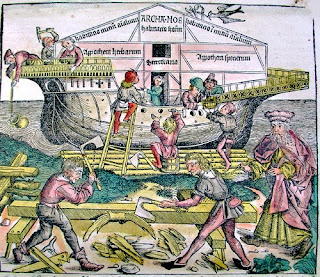
As the people of New Orleans (now evacuating from that city) await the arrival of Gustav, a potentially devastating hurricane, my friend, action reporter Bill Capo of WLTV in New Orleans, reports that the mood is of “feelings of disbelief and dread citywide as we prepare to go through it again, and it could even be worse this time.”
The word “deluge” comes directly from Latin (via French) “diluvium” (flood). Diluvium, in turn, comes from de-luere, or to wash away. We have relatives of “luvere,” “to wash,” in our words “laundry,” (what one washes) “lavatory,” (the room where one washes), “lave” (to wash, but antique), and, surprisingly, “lye,” which has been used since the 12th century to produce soap.
One of the most quoted remarks about floods, “Apres moi, le deluge,” (“after me, the flood”) was not actually about flooding at all, but about the terrible situation created when King Louis XV ruined the economy of France by high living while his people suffered in poverty. The result was the French Revolution. In that case, the floods were not of water, but of blood.
A succinct explanation of the French situation follows (copied from a Paul Jay’s entry in the Save Our Wetlands website):
The leader of the most powerful country on earth, with an unquestioned faith in his divine right to rule and the absolute power of the centralized state, was the namesake for Louisiana.
When he died in 1715, Louis XIV had built France into the dominant power in Europe, but he bankrupted the nation, forcing him to levy high taxes on the peasantry while the nobility paid none at all. Most people lived in poverty while the King built an empire.
During the empire’s demise his great great grandson Louis XV ruled France and its possessions, which included the colonial city of New Orleans. He lived for indulgence and luxury as his people descended further into despair. It is said near his end he uttered the words "Après moi le deluge." After me come the floods.
(September 5, 2005 By Paul Jay, Chair, Reprinted from: http://www.iwtnews.com Independent World News)
My thoughts are with the people of New Orleans and the Gulf Coast.




